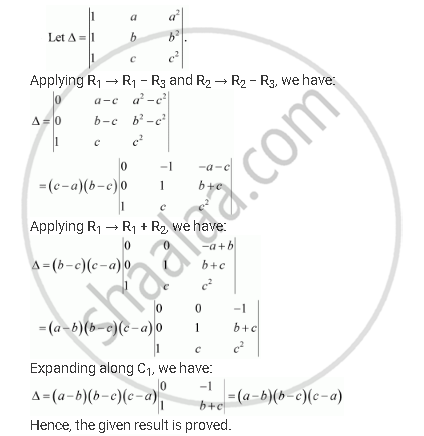Advertisements
Advertisements
Question
By using properties of determinants, show that:
`|(1,a,a^2),(1,b,b^2),(1,c,c^2)| = (a - b)(b-c)(c-a)`
Solution

APPEARS IN
RELATED QUESTIONS
By using properties of determinants, show that:
`|(0,a, -b),(-a,0, -c),(b, c,0)| = 0`
By using properties of determinants, show that:
`|(-a^2, ab, ac),(ba, -b^2, bc),(ca,cb, -c^2)| = 4a^2b^2c^2`
By using properties of determinants, show that:
`|(1+a^2-b^2, 2ab, -2b),(2ab, 1-a^+b^2, 2a),(2b, -2a, 1-a^2-b^2)| = (1+a^2+b^2)`
Evaluate `|(x, y, x+y),(y, x+y, x),(x+y, x, y)|`
Evaluate `|(1,x,y),(1,x+y,y),(1,x,x+y)|`
Using properties of determinants, prove that:
`|[a^2 + 1, ab, ac], [ba, b^2 + 1, bc ], [ca, cb, c^2+1]| = a^2 + b^2 + c^2 + 1`
Using properties of determinants, prove the following:
`|(a, b,c),(a-b, b-c, c-a),(b+c, c+a, a+b)| = a^3 + b^3 + c^3 - 3abc`.
Solve the following equation: `|(x + 2, x + 6, x - 1),(x + 6, x - 1,x + 2),(x - 1, x + 2, x + 6)|` = 0
Without expanding the determinant, find the value of `|(10, 57, 107),(12, 64, 124),(15, 78, 153)|`.
Find the value (s) of x, if `|(1, 2x, 4x),(1, 4, 16),(1, 1, 1)|` = 0
Without expanding the determinants, show that `|(l, "m", "n"),("e", "d", "f"),("u", "v", "w")| = |("n", "f", "w"),(l, "e", "u"),("m", "d", "v")|`
Select the correct option from the given alternatives:
The value of a for which system of equation a3x + (a + 1)3 y + (a + 2)3z = 0 ax + (a +1)y + (a + 2)z = 0 and x + y + z = 0 has non zero Soln. is
Select the correct option from the given alternatives:
If x = –9 is a root of `|(x, 3, 7),(2, x, 2),(7, 6, x)|` = 0 has other two roots are
Answer the following question:
Without expanding determinant show that
`|("b" + "c", "bc", "b"^2"c"^2),("c" + "a", "ca", "c"^2"a"^2),("a" + "b", "ab", "a"^2"b"^2)|` = 0
Answer the following question:
If `|("a", 1, 1),(1, "b", 1),(1, 1, "c")|` = 0 then show that `1/(1 - "a") + 1/(1 - "b") + 1/(1 - "c")` = 1
Evaluate: `|("a" + x, y, z),(x, "a" + y, z),(x, y, "a" + z)|`
If x, y, z ∈ R, then the value of determinant `|((2x^2 + 2^(-x))^2, (2^x - 2^(-x))^2, 1),((3^x + 3^(-x))^2, (3^x -3^(-x))^2, 1),((4^x + 4^(-x))^2, (4^x - 4^(-x))^2, 1)|` is equal to ______.
If cos2θ = 0, then `|(0, costheta, sin theta),(cos theta, sin theta,0),(sin theta, 0, cos theta)|^2` = ______.
If the determinant `|(x + "a", "p" + "u", "l" + "f"),("y" + "b", "q" + "v", "m" + "g"),("z" + "c", "r" + "w", "n" + "h")|` splits into exactly K determinants of order 3, each element of which contains only one term, then the value of K is 8.
The determinant `abs (("a","bc","a"("b + c")),("b","ac","b"("c + a")),("c","ab","c"("a + b"))) =` ____________
Using properties of determinants `abs ((1, "a", "a"^2 - "bc"),(1, "b", "b"^2 - "ca"),(1, "c", "c"^2 - "ab")) =` ____________.
Let P be any non-empty set containing p elements. Then, what is the number of relations on P?
If the ratio of the H.M. and GM. between two numbers a and bis 4 : 5, then a: b is
A system of linear equations represented in matrix form Ax = 0, A is n × n matrix, has a non-zero solution if the determinant of A (i.e., det(A)) is
In a third order matrix B, bij denotes the element in the ith row and jth column. If
bij = 0 for i = j
= 1 for > j
= – 1 for i < j
Then the matrix is
Let a, b, c be such that b(a + c) ≠ 0 if
`|(a, a + 1, a - 1),(-b, b + 1, b - 1),(c, c - 1, c + 1)| + |(a + 1, b + 1, c - 1),(a - 1, b - 1, c + 1),((-1)^(n + 2)a, (-1)^(n + 1)b, (-1)^n c)|` = 0, then the value of n is ______.
If `|(α, 3, 4),(1, 2, 1),(1, 4, 1)|` = 0, then the value of α is ______.
Without expanding determinants find the value of `|(10,57,107), (12, 64, 124), (15, 78, 153)|`
Without expanding determinants find the value of `|(10,57,107),(12,64,124),(15,78,153)|`
By using properties of determinant prove that `|(x + y, y+z, z +x),(z,x,y),(1,1,1)| =0`
By using properties of determinant prove that
`|(x+ y,y+z, z+x ),(z, x,y),(1,1,1)|` = 0
By using properties of determinant prove that `|(x+y,y+z,z+x),(z,x,y),(1,1,1)|` = 0.
Without expanding evaluate the following determinant:
`|(1, a, b + c), (1, b, c + a), (1, c, a + b)|`
Without expanding evaluate the following determinant.
`|(1, a, b+c),(1, b, c+a),(1, c, a+b)|`
Without expanding determinants, find the value of `|(10, 57, 107),(12, 64, 124),(15, 78, 153)|`
By using properties of determinant prove that `|(x+y,y+z,z+x),(z,x,y),(1,1,1)|` = 0.
